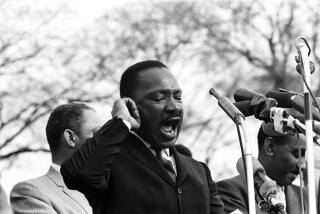Review: Driven to solve murders in Stephen King’s ‘Mr. Mercedes’
Few would dispute that Stephen King is the champion of genre fiction. Since 1974’s “Carrie,” King has been scaring the bejesus out of readers (and, on occasion, filmgoers) with more than 50 novels and shorter fiction that seem grounded in our everyday circumstances (a high school girl being bullied, a writer exploring new directions in his fiction) but that take flight into horrific territory where lives, and sometimes life as we know it, hangs in the balance.
While horror is most often his métier, the prolific Mr. King makes another foray (after last year’s “Joyland”) into the mystery-thriller realm with “Mr. Mercedes.” It’s April 2009 in an unnamed Midwestern city. Hundreds of unemployed citizens line up at the City Center the night before a job fair that promises “1000 JOBS GUARANTEED!” In a few sharply drawn pages, we come to know some of them and their struggles, witness acts of kindness they display toward one another as they hunker down in the thick fog.
The following morning, during an “anti-dawn, damp and cold as the cheek of a day-old corpse,” a gray Mercedes-Benz SL500 “not just emerging from the fog but seeming to create itself from it” aims for the huddled masses, 12 cylinders screaming. The car, we soon learn, was stolen from an aging widow named Olivia Trelawney; she may have abetted the crime by leaving her extra key fob in the car, allowing the driver — dubbed “Mr. Mercedes” by the press — to kill eight people and seriously injure over a dozen more. Several months later, a guilt-ridden Mrs. Trelawney commits suicide and Mr. Mercedes is still at large.
The unsolved case is one of a few clouds hanging over the career of Detective Kermit “Bill” Hodges, now retired and planted in a La-Z-Boy recliner, drowning in pugilistic daytime talk shows, a .38 Smith & Wesson M&P revolver at the ready. So depressed with his life (and the brain-numbing afternoon television) he’s been contemplating eating his gun, Hodges is literally saved by the mail, which includes a evilly cheerful letter from someone claiming to be Mr. Mercedes, the “perk” (as he calls himself) in the City Center massacre.
In the letter, Mr. Mercedes not only confesses to the crime but gloats over the accomplishment: “I think a great many people would enjoy doing what I did, and that is why they enjoy books and movies (and even TV shows these days) that feature Torture and Dismemberment…The only difference is I really did it.”
Mr. Mercedes’ taunts are enough to propel “Det.-Ret.” Hodges out of his recliner and back into action, trying to catch a killer who has left few clues — even the clown mask worn during the attack was scrubbed with bleach before being abandoned in the vehicle. The most promising development is Mr. Mercedes’ invitation to Hodges to visit social media site Under Debbie’s Blue Umbrella, where he goads the retired detective with hints of more mayhem to come.
Readers will come to know Bill Hodges intimately through his dogged pursuit of Mr. Mercedes and care deeply about those he enlists as his allies, including: Janelle Patterson, Olivia Trelawney’s sister, who wants Mr. Mercedes punished for causing her sister’s suicide; Janelle’s mentally ill niece, Holly, a middle-aged, emotionally stunted woman; and Jerome Robinson, a whip-smart African American teen who cuts Hodges’ yard and helps him understand his computer.
The counterbalance to this ragtag group of crime fighters is Mr. Mercedes himself, identified early on as Brady Hartsfield. On the surface, the twentysomething Brady is as normal as blueberry pie — works at a local electronics store, has a second job driving the neighborhood ice cream truck and lives with his mother. Yet beneath that ordinary veneer is an angry, hate-filled man inundated by a violence-saturated culture — replete with serial killer stories, violent video games, Lee Childs novels and Wild Bunch screen savers—which doesn’t exactly light Brady’s murderous fire but certainly fans the flames burning inside him.
Given that there are more than a few references and allusions to King’s own fiction and screen adaptations sprinkled throughout the novel, it’s hard to ignore the author’s role in shaping the tropes of that universe.
That said, King’s richly layered, technologically savvy story that illuminates Mr. Mercedes, his evil deeds and even more monstrous plans is uncomfortable yet riveting to read. Alternating between Hodges’ and Brady’s points of view sets the stage for a creepy, ripped-from-the headlines climax, a showdown between good and evil that characterizes the best of King’s work, regardless of genre. And without spoiling the fun of reading this excellent addition to King’s growing list of mystery-thriller titles, there’s even a small hint that the Mr. Mercedes show may go on — a scary thought indeed.
Woods has written four mysteries in the Charlotte Justice series and edited several anthologies.
Mr. Mercedes
A novel
Stephen King
Scribner: 436 pp; $30
More to Read
Sign up for our Book Club newsletter
Get the latest news, events and more from the Los Angeles Times Book Club, and help us get L.A. reading and talking.
You may occasionally receive promotional content from the Los Angeles Times.







